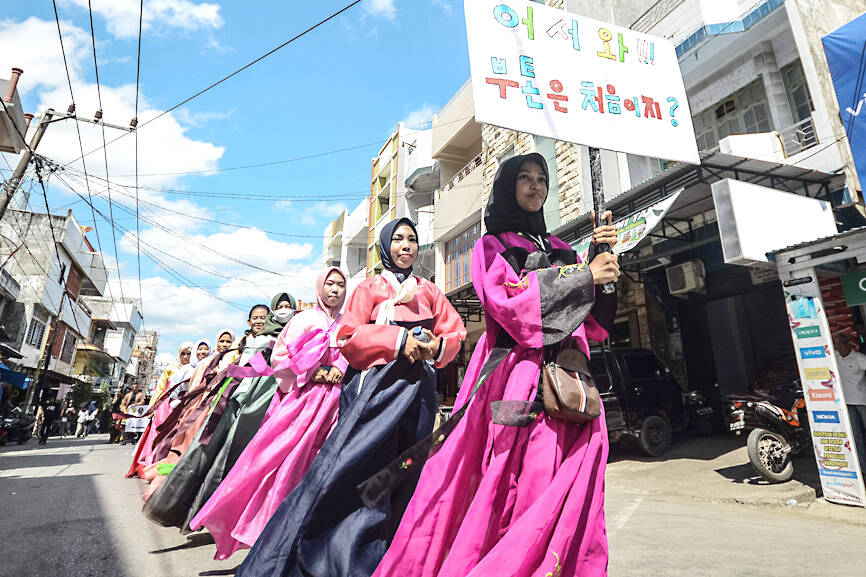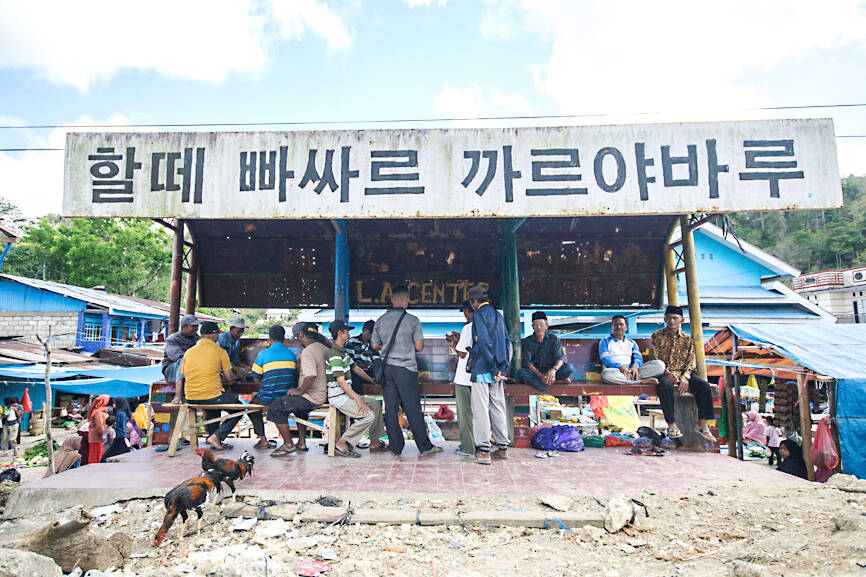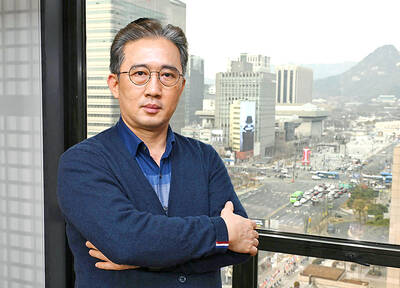In an eastern Indonesian village, schoolchildren scrawl the distinctive circles and lines of Hangul script on a whiteboard, but the language they are learning is not Korean — it is their own indigenous Cia-Cia tongue.
The language of the Cia-Cia ethnic group in southeast Sulawesi Province’s Baubau has no written form and the syllable-based tongue does not readily translate to the Latin alphabet often used to transcribe Indonesia’s national language.
However, the Korean Hangul script, developed in the 15th century, shares a syllable-based system that has made it an unusual tool in the effort to preserve and transmit the language of the approximately 80,000 Cia-Cia people.

Photo: AFP
“In Latin words, for instance, there’s no agreed way to pronounce the sounds ‘pha’ or ‘ta,’ but after I learned Korean, it turns out there are Korean characters for the sounds,” said 48-year-old teacher Abidin, who goes by one name. “They are not exactly the same, but they’re similar.”
Indonesia is a vast archipelago nation with myriad tribes and cultures that boasts more than 700 unique languages, making it one of the most linguistically diverse nations in the world.
The country’s official language is Bahasa Indonesia, which owes its standard written form using Latin letters to Dutch colonial rule.

Photo: AFP
However, the Cia-Cia’s language had no surviving written form until 2009, when Hangul was introduced after a cultural exchange between Baubau city and South Korean academics.
The decision was the outcome of a concerted push by South Korean linguists, who visited to tout Hangul’s sound-based system as the perfect fit.
After the visit, the city sent teachers and students to South Korea to learn Hangul with the goal of developing a standard way to write and teach their language.
In ancient times, leaders of the community committed the language to scraps of paper and wood using non-standard symbols that were never passed down and withered away.
However, today Cia-Cia names dot the city’s schools, streets and government institutions, rendered in Hangul.
The tongue is also taught to students from elementary to high school using Hangul symbols, although it remains largely a spoken rather than written language.
Abidin spent six months in South Korea training on Hangul and is seen as a pioneer of transcribing Cia-Cia in the script. He has even penned a dictionary for the language using Hangul.
Hangul is viewed with great pride in South Korea, where it was once banned under Japanese rule, and word of the script’s role in Indonesia has been hailed by some politicians and newspapers as proof of the writing system’s global presence.
Its adoption by the Cia-Cia illustrated a fierce desire to preserve their language, said Dalan Mehuli Perangin-angin, a linguist at Indonesia’s Sanata Dharma University.
“This shows that there is a longing from the people for their own script,” he said.
Even the spoken form of Cia-Cia faces pressure from the dominance of Bahasa Indonesia and other regional languages, said Ilyas, a local elder, who goes by one name.
“Many words have been lost due to the influence of Indonesian and other regional languages. This has been happening for about 20 years,” the 50-year-old said.
Fears about their language’s future prompted elders to accept the use of Hangul, but some do have concerns.
Baubau is the only place in Indonesia to use Hangul, and while the South Korean push for the script is not backed by Seoul, its nationalist tint could blur the community’s identity, Periangin-angin said.
“Language contains memories, history, morality and wisdom of our ancestors. A language script is a legacy,” he said.
He suggests the Cia-Cia could have adopted a script already used by another language in Sulawesi, which would have had closer linguistic links.
However, for Sarianto, who was among the students who learned Hangul in South Korea, the script has “sparked the creation of new discourses dedicated to the preservation of the Cia-Cia language.”
“Before the introduction of Hangul, many of Cia-Cia people used to feel a bit hesitant about using the local language in formal settings,” he said. “However, with the implementation of Hangul, people say our Cia-Cia language has become global.”

VAGUE: The criteria of the amnesty remain unclear, but it would cover political violence from 1999 to today, and those convicted of murder or drug trafficking would not qualify Venezuelan Acting President Delcy Rodriguez on Friday announced an amnesty bill that could lead to the release of hundreds of prisoners, including opposition leaders, journalists and human rights activists detained for political reasons. The measure had long been sought by the US-backed opposition. It is the latest concession Rodriguez has made since taking the reins of the country on Jan. 3 after the brazen seizure of then-Venezuelan president Nicolas Maduro. Rodriguez told a gathering of justices, magistrates, ministers, military brass and other government leaders that the ruling party-controlled Venezuelan National Assembly would take up the bill with urgency. Rodriguez also announced the shutdown

Chinese President Xi Jinping’s (習近平) purge of his most senior general is driven by his effort to both secure “total control” of his military and root out corruption, US Ambassador to China David Perdue said told Bloomberg Television yesterday. The probe into Zhang Youxia (張又俠), Xi’s second-in-command, announced over the weekend, is a “major development,” Perdue said, citing the family connections the vice chair of China’s apex military commission has with Xi. Chinese authorities said Zhang was being investigated for suspected serious discipline and law violations, without disclosing further details. “I take him at his word that there’s a corruption effort under

China executed 11 people linked to Myanmar criminal gangs, including “key members” of telecom scam operations, state media reported yesterday, as Beijing toughens its response to the sprawling, transnational industry. Fraud compounds where scammers lure Internet users into fake romantic relationships and cryptocurrency investments have flourished across Southeast Asia, including in Myanmar. Initially largely targeting Chinese speakers, the criminal groups behind the compounds have expanded operations into multiple languages to steal from victims around the world. Those conducting the scams are sometimes willing con artists, and other times trafficked foreign nationals forced to work. In the past few years, Beijing has stepped up cooperation

The dramatic US operation that deposed Venezuelan president Nicolas Maduro this month might have left North Korean leader Kim Jong-un feeling he was also vulnerable to “decapitation,” a former Pyongyang envoy to Havana said. Lee Il-kyu — who served as Pyongyang’s political counselor in Cuba from 2019 until 2023 — said that Washington’s lightning extraction in Caracas was a worst-case scenario for his former boss. “Kim must have felt that a so-called decapitation operation is actually possible,” said Lee, who now works for a state-backed think tank in Seoul. North Korea’s leadership has long accused Washington of seeking to remove it from power